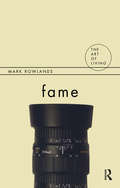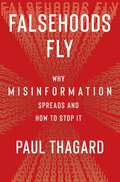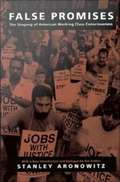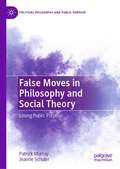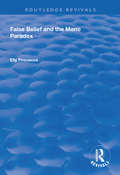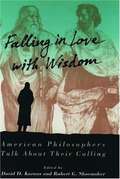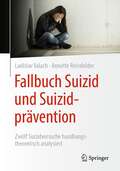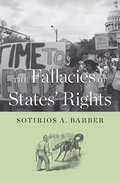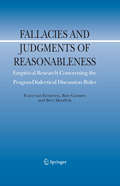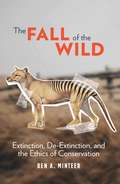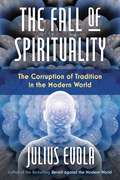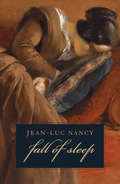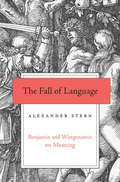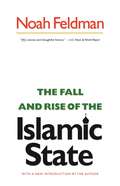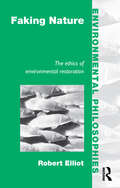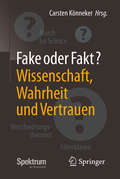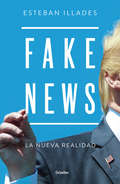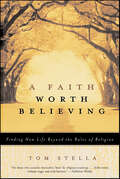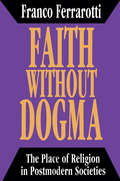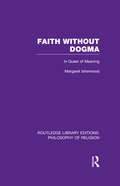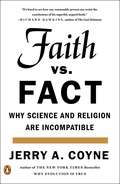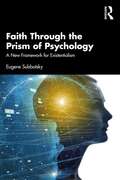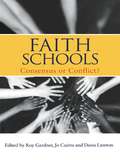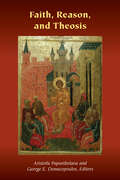- Table View
- List View
Fame (The Art of Living)
by Mark RowlandsOne of the most distinctive cultural phenomena of recent years has been the rise and rise of fame. In this book, Mark Rowlands argues that our obsession with fame has transformed it. Fame was once associated with excellence or achievement in some or other field of endeavour. But today we are obsessed with something that is, in effect, quite different: fame unconnected with any discernible distinction, fame that allows a person to be famous simply for being famous. This book shows why this new fame is simultaneously fascinating and worthless. To understand this new form of fame, Rowlands maintains, we have to engage in an extensive philosophical excavation that takes us back to a dispute that began in ancient Greece between Plato and Protagoras, and was carried on in a remarkable philosophical experiment that began in eighteenth-century France. Somewhat like contestants on a reality TV show, today we find ourselves, unwittingly, playing out the consequences of this experiment.
Falsehoods Fly: Why Misinformation Spreads and How to Stop It
by Paul ThagardMisinformation is one of the twenty-first century’s greatest challenges, a peril to democracy, peace, science, and public health. Yet we lack a clear understanding of what makes misinformation so potent and why it can spread so rapidly. In Falsehoods Fly, a leading cognitive scientist and philosopher offers a new framework for recognizing and countering misleading claims by exploring the ways that information works—and breaks down.Paul Thagard examines the dangers of misinformation on COVID-19, climate change, conspiracy theories, inequality, and the Russian invasion of Ukraine. He argues that effective responses to these problems require understanding how information is generated and spread. Bringing together empirical findings about the psychological and social mechanisms that drive cognitive errors with philosophical accounts of critical thinking, Thagard develops an innovative theory of how we gain information. Grasping how the generation and transmission of knowledge can fail helps us find ways to repair it and provides tools for converting misinformation into facts. Offering a deep and rich account of the nature and workings of information, Falsehoods Fly provides practical, concrete strategies to stop the creation and spread of misinformation.
False Promises: The Shaping of American Working Class Consciousness
by Stanley AronowitzThe book explains the historical development of the working class, particularly its ethnic, sexual, racial, and skill divisions and charts the relationship between these divisions and working class institutions, particularly the trade unions. And Part One of this book discusses the new developments in working class life and labor.
False Moves in Philosophy and Social Theory: Losing Public Purpose (Political Philosophy and Public Purpose)
by Patrick Murray Jeanne SchulerThis book considers diverse philosophical topics unified by the identification of false moves commonly found in modern philosophy, mainstream Anglo-American philosophy, and social theory. The authors expose the sources of fundamental problems that recur in philosophy—basic problems with what the authors call "factoring philosophy." Factoring philosophy fails to attend to the phenomenological task of determining when what is distinguishable is separable and when not. Consequently, factoring philosophy makes phenomenological mistakes—false moves—when it treats as separable what is only distinguishable. Analytic philosophy is prone to false moves when it fails to recognize that phenomenology is the necessary complement to analysis. There is nothing wrong with analysis—we might as well give up thinking as give up analysis—and nothing is wrong with the values prized by analytic philosophy. As Hegel observed, “philosophizing requires, above all, that each thought should be grasped in its full precision and that nothing should remain vague and indeterminate.” Ultimately, this book contends that false moves prevail in philosophical analysis and social theory when they neglect their phenomenological foundations.
False Belief and the Meno Paradox
by Elly PirocacosPublished in 1998, the philosophical concern of this book is epistemological in kind. It involves understanding the Socratic elentic method and how its structure introduces an important epistemological problem which is first raised in the "Meno" dialogue as a paradox. This paradox, named the Meno paradox, raises the problem of falsehood. Specifically the impossibility of falsehood. The "Theaetetus" dialogue is then analyzed in terms of how falsehood is there set up as a clearly epistemological problem. The "Sophist" dialogue is in turn discussed as offering a response to the problem of falsehood by revising it as a problem for semantics.
Falling in Love with Wisdom: American Philosophers Talk about Their Calling
by David D. Karnos Robert G. Shoemaker64 memoirs reveal that the road to wisdom has many on-ramps.
Fallbuch Suizid und Suizidprävention: Zwölf Suizidversuche handlungstheoretisch analysiert
by Ladislav Valach Annette ReissfelderEine junge Frau wird von ihrem Freund verlassen, ein älterer Mann wird pensioniert und fühlt sich wertlos und einsam, ein junger Mann erfährt, dass seine Frau eine außereheliche Beziehung pflegt. Sie alle sehen nur noch den Suizid als Lösung. Üblicherweise werden Personen nach einem Suizidversuch in einem Krankenhaus behandelt, wo Fachpersonen versuchen, die zugrunde liegende psychiatrische Erkrankung herauszuarbeiten. Ladislav Valach und Annette Reissfelder argumentieren jedoch, dass Suizid nicht eine Krankheit, sondern eine Handlung ist. Da diesem Verständnis die Hochschätzung alltäglicher Darstellungen eigener Erlebnisse zugrunde liegt, wird in diesem Buch den suizidalen Personen die Bühne freigegeben. Das Fachbuch stellt zwölf verschiedene Fälle nach einem Suizidversuch vor. Bei der Analyse der Gespräche wird auf die Handlungstheorie des Alltags geachtet. Durch die Darstellung der langfristigen, mittel- und kurzfristigen Anliegen der Patient*innen bzw. den Handlungen in den Geschichten, erhalten Praktizierende einen detaillierten Einblick in die der Suizidhandlung zugrunde liegenden Ursachen und deren Behandlung.
The Fallacies of States' Rights
by Sotirios A. BarberThe idea that states’ rights restrain national power is riding high in American judicial and popular opinion. Here, Sotirios A. Barber shows how arguments for states’ rights, from the days of John C. Calhoun to the present, have offended common sense, logic, and bedrock constitutional principles. To begin with, states’ rights federalism cannot possibly win the debate with national federalism owing to the very forum in which the requisite argument must occur-a national one, thanks to the Civil War-and the ordinary rules of practical argumentation. Further, the political consequences of this self-defeating logic can only hasten the loss of American sovereignty to international economic forces. Both philosophical and practical reasons compel us to consider two historical alternatives to states’ rights federalism. In the federalism of John Marshall, the nation’s most renowned jurist, the national government’s duty to ensure security, prosperity, and other legitimate national ends must take precedence over all conflicting exercises of state power. In process federalism, the Constitution protects the states by securing their roles in national policy making and other national decisions. Barber opts for Marshall’s federalism, but the contest is close, and his analysis takes the debate into new, fertile territory. Affirming the fundamental importance of the Preamble, Barber advocates a conception of the Constitution as a charter of positive benefits for the nation. It is not, in his view, a contract among weak separate sovereigns whose primary function is to protect people from the central government, when there are greater dangers to confront.
Fallacies and Judgments of Reasonableness
by Bert Meuffels Frans H. van Eemeren Bart GarssenIn Fallacies and Judgments of Reasonableness, Frans H. van Eemeren, Bart Garssen and Bert Meuffels report on their systematic empirical research of the conventional validity of the pragma-dialectical discussion rules. The experimental studies they carried out during more than ten years start from the pragma-dialectical theory of argumentation developed at the University of Amsterdam, their home university. In these studies they test methodically the intersubjective acceptability of the rules for critical discussion proposed in this theory by confronting ordinary arguers who have not received any special education in argumentation and fallacies with discussion fragments containing both fallacious and non-fallacious argumentative moves. The research covers a wide range of informal fallacies. In this way, the authors create a basis for comparing the theoretical reasonableness conception of pragma-dialectics with the norms for judging argumentative moves prevailing in argumentative practice. Fallacies and Judgments of Reasonableness provides a unique insight into the relationship between theoretical and practical conceptions of reasonableness, supported by extensive empirical material gained by means of sophisticated experimental research.
The Fall of the Wild: Extinction, De-Extinction, and the Ethics of Conservation
by Ben A. MinteerThe passenger pigeon, the great auk, the Tasmanian tiger—the memory of these vanished species haunts the fight against extinction. Seeking to save other creatures from their fate in an age of accelerating biodiversity loss, wildlife advocates have become captivated by a narrative of heroic conservation efforts. A range of technological and policy strategies, from the traditional, such as regulations and refuges, to the novel—the scientific wizardry of genetic engineering and synthetic biology—seemingly promise solutions to the extinction crisis.In The Fall of the Wild, Ben A. Minteer calls for reflection on the ethical dilemmas of species loss and recovery in an increasingly human-driven world. He asks an unsettling but necessary question: Might our well-meaning efforts to save and restore wildlife pose a threat to the ideal of preserving a world that isn’t completely under the human thumb? Minteer probes the tension between our impulse to do whatever it takes and the risk of pursuing strategies that undermine our broader commitment to the preservation of wildness. From collecting wildlife specimens for museums and the wilderness aspirations of zoos to visions of “assisted colonization” of new habitats and high-tech attempts to revive long-extinct species, he explores the scientific and ethical concerns vexing conservation today. The Fall of the Wild is a nuanced treatment of the deeper moral issues underpinning the quest to save species on the brink of extinction and an accessible intervention in debates over the principles and practice of nature conservation.
The Fall of Spirituality: The Corruption of Tradition in the Modern World
by Julius Evola• Examines newer spiritual &“systems&” of the modern era, from spiritism and theosophy, to parapsychic research and anthroposophism, to psychoanalysis and the Church of Satan • Compares these newer spiritual &“systems&” to the traditional spiritual path of the ancients and exposes the misunderstandings, misinterpretations, and occult dangers lurking in their practices • Also examines important modern figures such as Nietzsche, Aleister Crowley, Rudolf Steiner, Dostoevsky, Freud, Jung, Gurdjieff, Krishnamurti, and Anton LaVey Written two years before his most prominent book Revolt Against the Modern World, Julius Evola&’s The Fall of Spirituality was originally published in Italian as Maschera e volto dello spiritualismo contemporaneo (The Mask and Face of Contemporary Spiritualism). In it, the Baron critiques the spiritual schools, cults, philosophies, and mystical teachers of the 20th century--from spiritism and theosophy, to parapsychic research and anthroposophism, to psychoanalysis and the Church of Satan--comparing these newer spiritual &“systems&” to the traditional spiritual path of the ancients and exposing the misunderstandings, misinterpretations, and occult dangers lurking in their practices. Examining important modern figures such as Nietzsche, Aleister Crowley, Rudolf Steiner, Dostoevsky, Freud, Jung, Gurdjieff, Krishnamurti, and Anton LaVey, the author contends that their aspirations to power are limited to a focus on concerns of the mundane world. They are thereby blind to the existence of a supernatural reality that offers individuals transmutation from the fallen human personality into a semigod-like status--a status attainable only by those who can master the rigors demanded of initiates on the traditionalist path. Offering an essential guidebook for serious spiritual seekers looking for a more profound metaphysical discipline than those of the spiritual schools of the modern era, Evola also provides contrasting insights from the age-old path of initiation and high magic.
The Fall of Sleep
by Jean-Luc Nancy Charlotte MandellPhilosophers have largely ignored sleep, treating it as a useless negativity, mere repose for the body or at best a source for the production of unconscious signs out of the night of the soul. In an extraordinary theoretical investigation written with lyric intensity, The Fall of Sleep puts an end to this neglect by providing a deft yet rigorous philosophy of sleep. What does it mean to "fall" asleep? Might there exist something like a "reason" of sleep, a reason at work in its own form or modality, a modality of being in oneself, of return to oneself, without the waking "self" that distinguishes "I" from "you" and from the world? What reason might exist in that absence of ego, appearance, and intention, in an abandon thanks to which one is emptied out into a non-place shared by everyone? Sleep attests to something like an equality of all that exists in the rhythm of the world. With sleep, victory is constantly renewed over the fear of night, an a confidence that we will wake with the return of day, in a return to self, to us--though to a self, an us, that is each day different, unforeseen, without any warning given in advance. To seek anew the meaning stirring in the supposed loss of meaning, of consciousness, and of control that occurs in sleep is not to reclaim some meaning already familiar in philosophy, religion, progressivism, or any other -ism. It is instead to open anew a source that is not the source of a meaning but that makes up the nature proper to meaning, its truth: opening, gushing forth, infinity. This beautiful, profound meditation on sleep is a unique work in the history of phenomenology--a lyrical phenomenology of what can have no phenomenology, since sleep shows itself to the waking observer, the subject of phenomenology, only as disappearance and concealment.
The Fall of Language: Benjamin and Wittgenstein on Meaning
by Alexander SternKnown for his essays on culture, aesthetics, and literature, Walter Benjamin also wrote on the philosophy of language. For Alexander Stern, his famously obscure—and, for some, hopelessly mystical—early work contains important insights, anticipating and in some respects surpassing Wittgenstein’s later thinking on the philosophy of language.
The Fall and Rise of the Islamic State
by Noah FeldmanPerhaps no other Western writer has more deeply probed the bitter struggle in the Muslim world between the forces of religion and law and those of violence and lawlessness as Noah Feldman. His scholarship has defined the stakes in the Middle East today. Now, in this incisive book, Feldman tells the story behind the increasingly popular call for the establishment of the shari'a--the law of the traditional Islamic state--in the modern Muslim world. Western powers call it a threat to democracy. Islamist movements are winning elections on it. Terrorists use it to justify their crimes. What, then, is the shari'a? Given the severity of some of its provisions, why is it popular among Muslims? Can the Islamic state succeed--should it? Feldman reveals how the classical Islamic constitution governed through and was legitimated by law. He shows how executive power was balanced by the scholars who interpreted and administered the shari'a, and how this balance of power was finally destroyed by the tragically incomplete reforms of the modern era. The result has been the unchecked executive dominance that now distorts politics in so many Muslim states. Feldman argues that a modern Islamic state could provide political and legal justice to today's Muslims, but only if new institutions emerge that restore this constitutional balance of power. The Fall and Rise of the Islamic State gives us the sweeping history of the traditional Islamic constitution--its noble beginnings, its downfall, and the renewed promise it could hold for Muslims and Westerners alike. In a new introduction, Feldman discusses developments in Egypt, Tunisia, Libya, and other Muslim-majority countries since the Arab Spring and describes how Islamists must meet the challenge of balance if the new Islamic states are to succeed.
Faking Nature: The Ethics of Environmental Restoration (Environmental Philosophies)
by Robert ElliotFaking Nature explores the arguments surrounding the concept of ecological restoration. This is a crucial process in the modern world and is central to companies' environmental policy; whether areas restored after ecological destruction are less valuable than before the damage took place. Elliot discusses the pros and cons of the argument and examines the role of humans in the natural world. This volume is a timely and provocative analysis of the simultaneous destruction and restoration of the natural world and the ethics related to those processes, in an era of accelerated environmental damage and repair.
Fake oder Fakt?
by Carsten KönnekerGibt es Alternativen zu Fakten?Dieses Buch greift die wichtigen Fragen auf, die seit dem „March for Science“ im Frühjahr 2017 auf der öffentlichen Agenda stehen: Untergraben „gefühlte Wahrheiten“ und „alternative Fakten“ zunehmend unsere gesellschaftlichen Debatten? Was kann überhaupt als gesichertes Wissen gelten - und wie gelangen Forscherinnen und Forscher an Evidenz? Ist wissenschaftsskeptisches oder gar -feindliches Denken auf dem Vormarsch? Und was macht Menschen anfällig für Fake News und Verschwörungstheorien?Die hier versammelten Beiträge aus Spektrum der Wissenschaft, Gehirn&Geist sowie spektrum.de liefern vielfältige Anregungen, neu über Wahrheit, Unwahrheit, Glaubwürdigkeit und Vertrauen in die Wissenschaft nachzudenken. Der erste Teil des Buches behandelt die Frage, was Fakten ausmacht und wie Wissenschaftler sie gewinnen. Hier wird unter anderem deutlich, dass Forschung keine ewigen Gewissheiten produziert, sondern dass Interpretation, Vorläufigkeit und Revision sie im Gegenteil geradezu kennzeichnen. Der zweite Teil stellt Fake News und Verschwörungstheorien in den Mittelpunkt und erläutert, was Menschen dazu bringt, selbst die krudesten Behauptungen für bare Münze zu nehmen - und wie sich Lügen medial verbreiten. Der abschließende Teil widmet sich der Frage, wie Vertrauen in Wissenschaft entsteht und welche systemischen Schwachstellen des Wissenschaftsbetriebs dieses unterminieren können.
Fake News: La nueva realidad
by Esteban IlladesEl mayor peligro del acceso ilimitado a la información es que siempre hay alguien que la acepta sin cuestionar. En la prensa escrita y en la digital, en las redes sociales y en los medios tradicionales, un torrente de mentiras, propaganda e inexactitudes -motivadas por el afán de dinero, notoriedad o poder- se mezcla y confunde con el reporte de hechos reales. Jamás ha sido tan fácil ser engañado: a la censura y el espionaje se han sumado la sobreinformación y las fake news. En este escenario, que parece sacado de una distopía orwelliana, la ética periodística, la confirmación y el rigor parecen reliquias olvidadas. El fenómeno es poderosísimo y ya define el rumbo del mundo: en buena parte gracias a la difusión de «noticias» falsas, Donald Trump ganó la Presidencia de Estados Unidos. Y no es un fenómeno ajeno. En México, las fake news son pan de todos los días, como lo demostró el «caso Frida Sofía». Ya jugaron un papel clave en la elección de 2012 y sin duda serán protagonistas este 2018. En este libro, el periodista Esteban Illades examina decenas de casos en los que la confusión y la falsedad han llevado a resultados catastróficos, y explora las razones de que -en plena Era del Conocimiento- sigamos creyendo datos imposibles y, por el contrario, negando evidencias irrefutables.
A Faith Worth Believing: Finding New Life Beyond the Rules of Religion
by Tom StellaHow can we have an authentic faith when we no longer have well-defined, codified beliefs? Where do we turn to better understand our relationship with God when the messages of the Church seem simplistic? This book is for all those who are asking the tough questions and are not satisfied with the answers they are receiving.
Faith without Dogma: Place of Religion in Postmodern Societies
by Franco FerrarottiWe live in a time of high Church membership, but low Church attendance. Franco Ferrarotti, arguably the most important sociologist of religion alive, captures the source of this paradox In the title of his new book, Faith without Dogma. For it is belief that propels membership, while the absence of dogma results in a reticence to accept hierarchical direction from above or beyond.Basing much of his analysis on the postwar struggles within Roman Catholicism, Ferrarotti views the demand for religious renewal and revival as part and parcel of the emergence of broad social agendas—agendas to which not even the Roman curia could remain impervious. The former easy relationships between Church and State, especially authoritarian states in Europe and Latin America, gave way to a critical defense of individual rights within a context of a broadened vision of Christian doctrine.In addition to issues Involved in internal affairs of religion, Ferrarotti explores a series of developments that have changed for all time the nature of Church survival. The critical element, one that goes beyond specific doctrinal accommodations, is the new primary connection of Church to people rather than Church to State. This came about through the widespread acceptance of science and technology as frames of intellectual reference, the emergence of secularization as mediating religious claims and the creation from the Enlightenment to the Postmodern eras of "civil religions."The volume concludes with a set of chapters on the nature of sacred events and objects, the emergence of new varieties of prayer, and concludes with a chapter on the relationship of ideology to theology prepared especially for the English language edition of Faith without Dogma. This is a book likely to attract a broad audience among religionists and culturologists, as well as social scientists.
Faith Without Dogma: In Quest of Meaning (Routledge Library Editions: Philosophy of Religion)
by Margaret IsherwoodLife is a constant search for meaning, and reflective minds need to find deeper and more comprehensive meaning than that normally proffered by the orthodox teaching of any creedal religion. When this book was initially published in 1964, religion had begun to recognize the importance of psychology and psychology had considered a spiritual principle in man. Miss Isherwood’s purpose in writing this book is to relate science and religion more closely. Her theme is that the evolution of consciousness from protozoa provides a link which not only gives grounds for faith in life and an inspiration for carrying development forward, but which reveals that, as we continuously work at deepening our insight into the realms of spirit, the life process appears to us as steadily more meaningful. Her engaging writing style makes this a fascinating glimpse at a philosophy of religion starting to engage with science.
Faith Versus Fact
by Jerry A. CoyneThe New York Times bestselling author explains why any attempt to make religion compatible with science is doomed to fail In his provocative new book, evolutionary biologist Jerry A. Coyne lays out in clear, dispassionate detail why the toolkit of science, based on reason and empirical study, is reliable, while that of religion--including faith, dogma, and revelation--leads to incorrect, untestable, or conflicting conclusions. Coyne is responding to a national climate in which over half of Americans don't believe in evolution (and congressmen deny global warming), and warns that religious prejudices and strictures in politics, education, medicine, and social policy are on the rise. Extending the bestselling works of Richard Dawkins, Daniel Dennett, and Christopher Hitchens, he demolishes the claims of religion to provide verifiable "truth" by subjecting those claims to the same tests we use to establish truth in science. Coyne irrefutably demonstrates the grave harm--to individuals and to our planet--in mistaking faith for fact in making the most important decisions about the world we live in.
Faith Versus Fact: Why Science and Religion Are Incompatible
by Jerry A. CoyneThe New York Times bestselling author explains why any attempt to make religion compatible with science is doomed to fail In his provocative new book, evolutionary biologist Jerry A. Coyne lays out in clear, dispassionate detail why the toolkit of science, based on reason and empirical study, is reliable, while that of religion--including faith, dogma, and revelation--leads to incorrect, untestable, or conflicting conclusions. Coyne is responding to a national climate in which over half of Americans don't believe in evolution (and congressmen deny global warming), and warns that religious prejudices and strictures in politics, education, medicine, and social policy are on the rise. Extending the bestselling works of Richard Dawkins, Daniel Dennett, and Christopher Hitchens, he demolishes the claims of religion to provide verifiable "truth" by subjecting those claims to the same tests we use to establish truth in science. Coyne irrefutably demonstrates the grave harm--to individuals and to our planet--in mistaking faith for fact in making the most important decisions about the world we live in.
Faith Through the Prism of Psychology: A New Framework for Existentialism
by Eugene SubbotskyFaith Through the Prism of Psychology introduces readers to the structure and function of the inherent ability of our Self to invest objects with reality — existentialization (EXON). The author moves away from traditional ideas of existence and faith, arguing that it is an inherent ability of an individual mind to invest entities (both objective and subjective) with reality. The book treats faith as a psychological ability of the mind to upgrade the existential statuses of imaginary entities, such as ghosts or gods; the working of faith is operationalized and analyzed in empirical psychological studies. It presents a new model of investing objects with existence, with such structural elements as the belief in object permanence (BOP), magic/ordinary distinguisher (MOD), magic/trick distinguisher (MTD), imaginary/perceived distinguisher (IPD), BOP defense mechanism (BOP/DM) and realities distinguisher (RD). It will be essential reading for anyone interested in existence from psychology, philosophy, art, theology or psychotherapy backgrounds.
Faith Schools: Consensus or Conflict?
by Roy Gardner Jo Cairns Denis LawtonUntil fairly recently the separation of pupils according to religion was felt to be compatible with a comprehensive education. That consensus no longer holds and there is a strong positive lobby either to absorb faith schools altogether within the state system or at least to dilute their membership ensuring they include children from other faiths, or no faith at all. This book addresses the current concerns, questions and interest surrounding the legitimacy, support and intended expansion of faith schools. Divided into five sections, it includes chapters on: * the legal frameworks for faith schools and the rights of the child* faith-based schools in the UK, Northern Ireland, France and the USA* the impact of faith schools on pupil performance* faith schools, religious education and citizenship* political and research issues. Faith Schools: Consensus or Conflict? is of interest to educators, policymakers, researchers and students of education, religion and sociology.
Faith, Reason, and Theosis (Orthodox Christianity and Contemporary Thought)
by William J. Abraham Peter C. Bouteneff Carolyn Chau Robert Glenn Davis Stephen J. Davis David Bentley Hart Philip Kariatlis Jean Porter Andrew Prevot Ashley M. Purpura Kirsi Stjerna Michele Watkins Rowan Williams Aristotle PapanikolaouTheosis shapes contemporary Orthodox theology in two ways: positively and negatively. In the positive sense, contemporary Orthodox theologians made theosis the thread that bound together the various aspects of theology in a coherent whole and also interpreted patristic texts, which experienced a renaissance in the twentieth century, even in Orthodox theology. In the negative sense, contemporary theologians used theosis as a triumphalistic club to beat down Catholic and Protestant Christians, claiming that they rejected theosis in favor of either a rationalistic or fideistic approach to Christian life.The essays collected in this volume move beyond this East–West divide by examining the relation between faith, reason, and theosis from Orthodox, Catholic, and Protestant perspectives. A variety of themes are addressed, such as the nature–grace debate and the relation of philosophy to theology, through engagement with such diverse thinkers as Thomas Aquinas, John Wesley, Meister Eckhart, Dionysius the Areopagite, Symeon the New Theologian, Panayiotis Nellas, Vladimir Lossky, Martin Luther, Martin Heidegger, Sergius Bulgakov, John of the Cross, Delores Williams, Evagrius of Pontus, and Hans Urs von Balthasar. The essays in this book are situated within a current thinking on theosis that consists of a common, albeit minimalist, affirmation amidst the flow of differences. The authors in this volume contribute to the historical theological task of complicating the contemporary Orthodox narrative, but they also continue the “theological achievement” of thinking about theosis so that all Christian traditions may be challenged to stretch and shift their understanding of theosis even amidst an ecumenical celebration of the gift of participation in the life of God.
